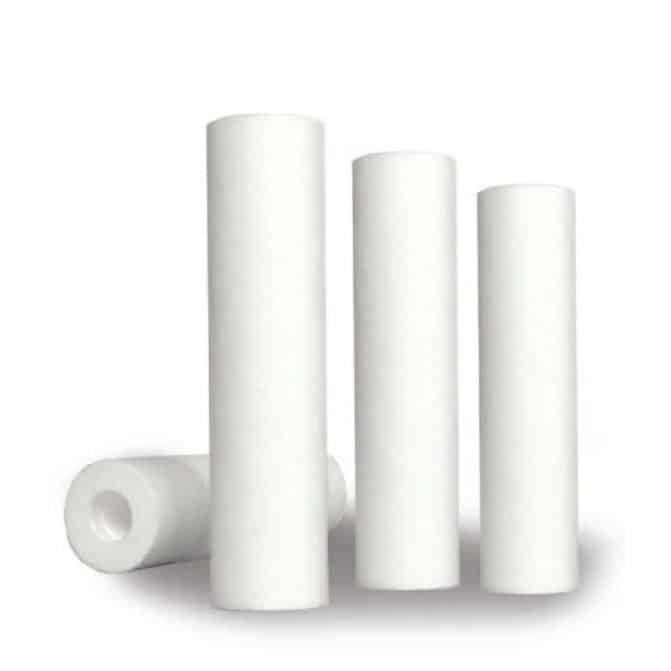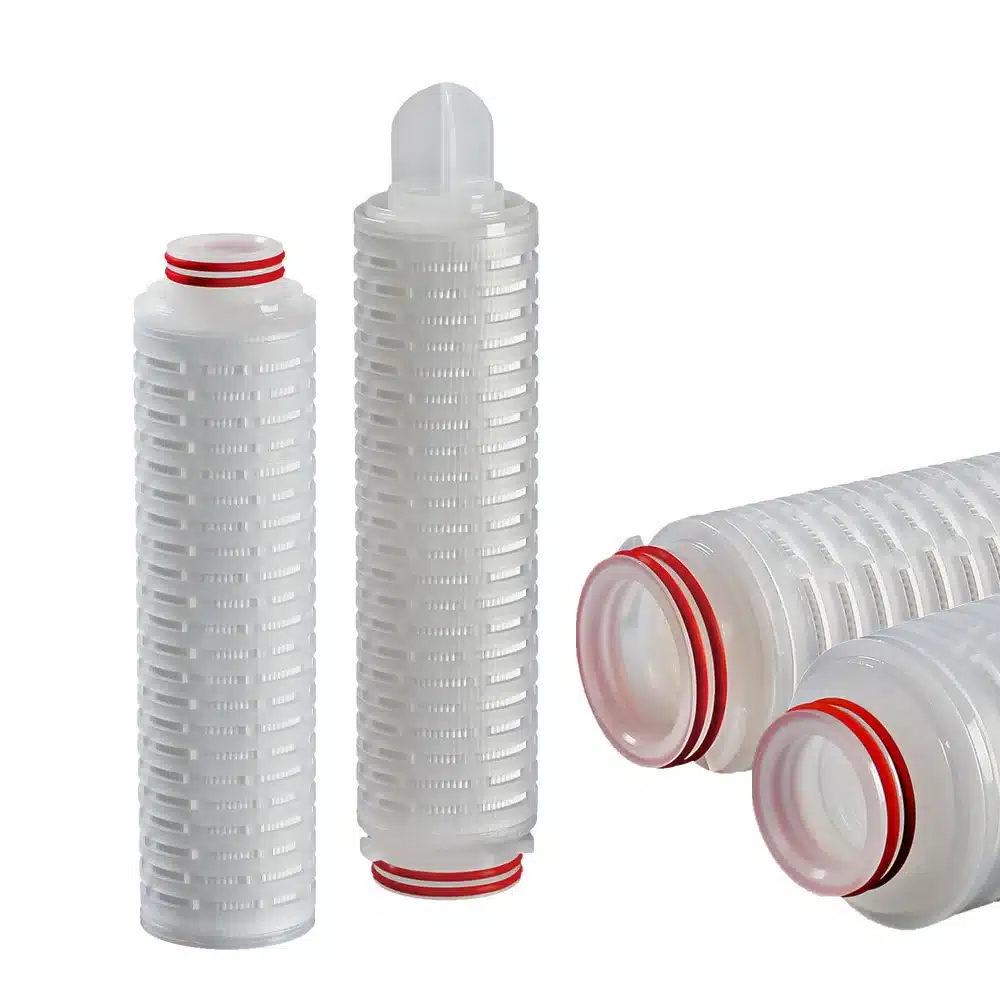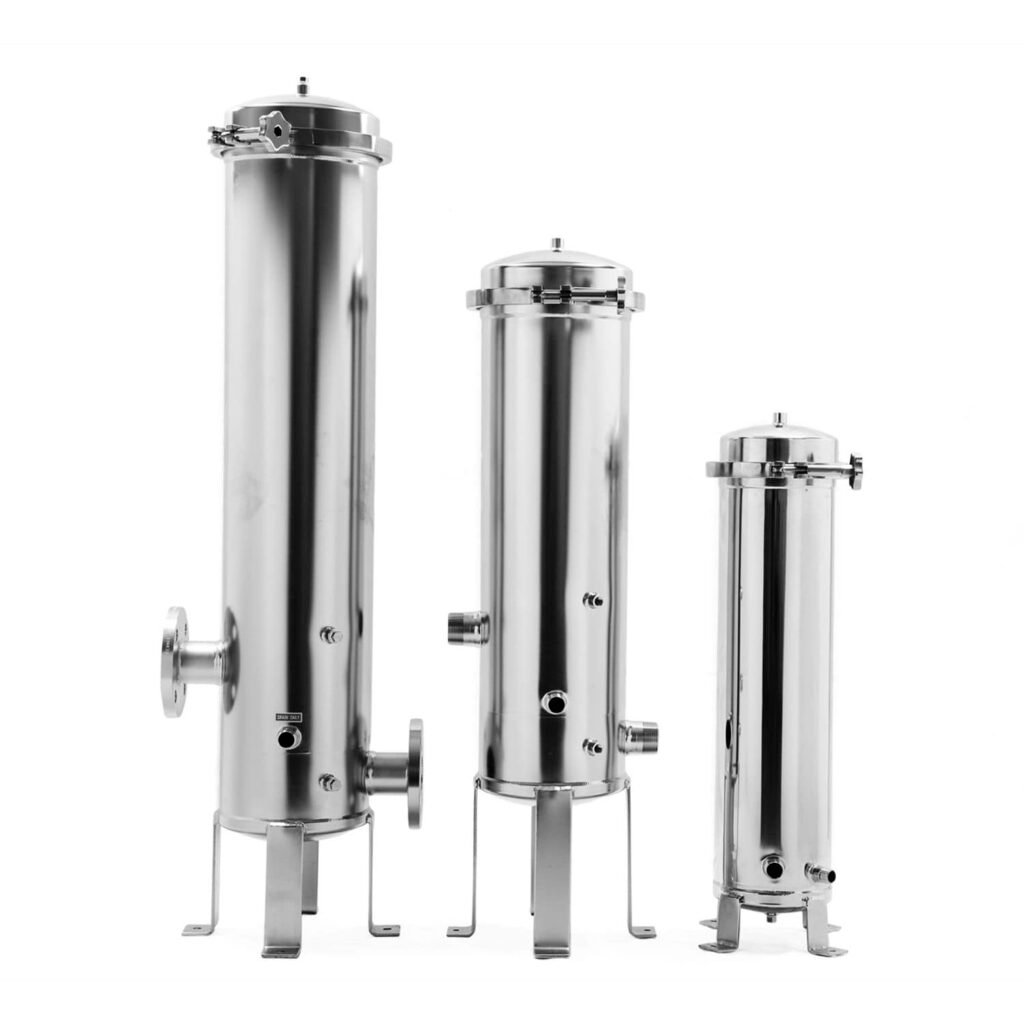Applications of Nylon Pleated Filter Cartridges
INTRODUCTION
In today’s highly demanding industrial environments, Nylon pleated filter cartridges have become one of the most versatile and widely used filtration solutions. Known for their mechanical strength, chemical resistance, and excellent filtration precision, nylon filters are used in a wide range of applications—from water purification and chemical processing to food, beverage, and pharmaceutical production.
Nylon, typically Nylon 6 or Nylon 66, is a hydrophilic synthetic polymer that offers outstanding moisture absorption and wettability, making it suitable for filtering both aqueous and organic solutions. The pleated design of these cartridges increases the effective surface area, providing higher dirt-holding capacity and longer service life compared to non-pleated filters.
This article explores in detail the applications, features, benefits, and performance advantages of nylon pleated filter cartridges across multiple industries. Whether you are a process engineer, procurement manager, or filtration system designer, understanding where and how to apply nylon filters can help you optimize filtration efficiency, reduce costs, and improve product quality.
1. Overview of Nylon Pleated Filter Cartridges
1.1 What Is a Nylon Pleated Filter Cartridge?
A nylon pleated filter cartridge is a depth-type or membrane filter made from Nylon 6 or Nylon 66 fibers, typically supported by polypropylene or stainless-steel cores and cages. The membrane is pleated to provide a large filtration surface area, ensuring high flow rates and extended operating cycles.
1.2 Key Structural Components
Filter Medium: Hydrophilic nylon membrane or nylon woven mesh.
Support Layers: Polypropylene (PP) or polyester.
Core and End Caps: Polypropylene, stainless steel, or reinforced nylon.
Sealing Method: Thermal bonding or adhesive-free welding.
Available Pore Sizes: 0.1 µm – 100 µm depending on filtration requirement.
1.3 Primary Features
Hydrophilic membrane — no need for pre-wetting with alcohol or surfactant.
High mechanical strength — resists collapse even under high differential pressures.
Excellent chemical resistance to alcohols, hydrocarbons, and weak acids/bases.
Wide operating temperature range (up to 95°C).
Compatibility with sterilization (steam or autoclave).
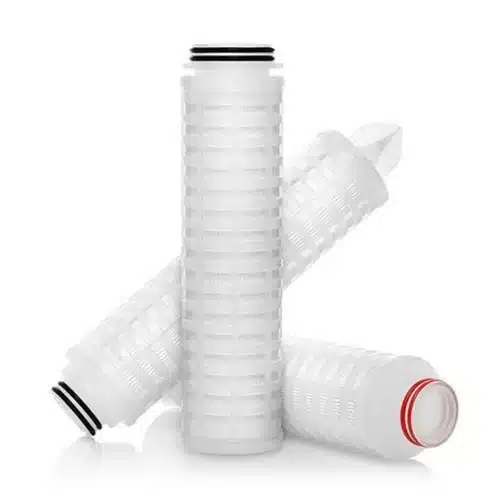
1.4 Typical Performance Parameters
| Parameter | Value |
|---|---|
| Filtration rating | 0.1 – 100 µm |
| Maximum operating temperature | 80–95°C |
| Maximum differential pressure | 4.0 bar at 25°C |
| Flow direction | Outside-in or inside-out |
| Wettability | Naturally hydrophilic |
| Common lengths | 5”, 10”, 20”, 30”, 40” |
Nylon pleated filters are available in absolute or nominal-rated versions, depending on the criticality of the application.
2. Working Principle
The filtration mechanism of nylon pleated cartridges is based on surface and depth filtration. When fluid passes through the pleated nylon membrane, particles larger than the pore size are retained on the surface, while smaller ones are captured within the internal fiber matrix.
Because nylon membranes are naturally hydrophilic, they easily allow water and polar solvents to pass through without the need for wetting agents. This results in:
Fast startup times
Consistent flow rates
Low initial pressure drops
The pleated structure increases the effective filtration area, which:
Extends filter life.
Reduces replacement frequency.
Lowers overall filtration cost per unit volume of fluid processed.
3. Applications in Water Treatment Industry
3.1 Industrial and Municipal Water Treatment
In water treatment systems, nylon pleated filter cartridges serve as precision filters for removing fine particles, rust, silt, and microorganisms. They are commonly used in:
Pre-filtration before reverse osmosis (RO) membranes.
Polishing filtration after sand or carbon filters.
Final filtration for high-purity or potable water.
Nylon filters’ excellent flow characteristics and durability make them ideal for both municipal water treatment plants and industrial process water systems.
3.2 Laboratory and Ultrapure Water Systems
In laboratory-grade water purification, nylon filters are used in:
Deionized (DI) and distilled water systems
Analytical water filtration
Rinse water for semiconductor cleaning processes
Because nylon is hydrophilic and has low extractables, it ensures minimal contamination in sensitive water purification applications.
4. Applications in Food and Beverage Industry
4.1 Beverage Clarification and Sterilization
Nylon pleated filter cartridges are widely used in the food and beverage industry for removing suspended solids, yeast, bacteria, and other contaminants. Common uses include:
Beer and wine clarification — removing turbidity and microbial contaminants.
Bottled water production — ensuring clarity and microbiological safety.
Soft drinks, juices, and syrups — protecting taste, color, and consistency.
4.2 Dairy and Edible Oil Filtration
Nylon filters effectively remove:
Protein aggregates and fat globules in dairy processing.
Impurities and particulates in edible oils, extending shelf life and product purity.
4.3 Advantages in Food Applications
Complies with FDA CFR Title 21 and EU food contact standards.
Free from adhesives or binders — preventing chemical contamination.
Compatible with sanitization chemicals and CIP (Clean-in-Place) systems.
Offers low pressure drop and high flow rate, ideal for continuous production lines.
Thus, nylon pleated cartridges are an excellent balance of filtration performance and economic efficiency in food processing environments.
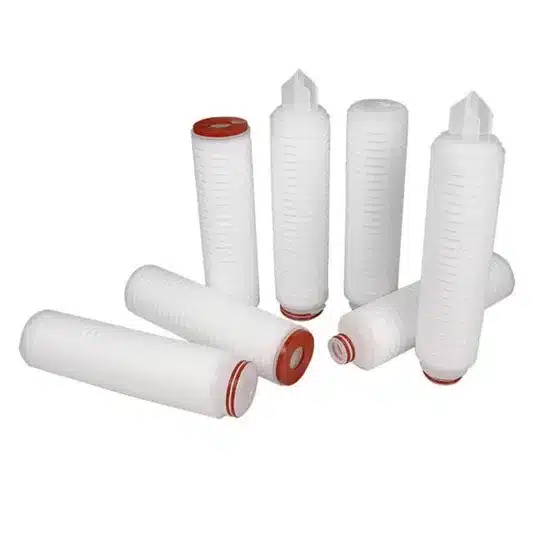
5. Applications in Pharmaceutical and Biotech Industries
5.1 Critical Liquid Filtration
In pharmaceutical production, nylon pleated filter cartridges are used for clarification, sterilization, and pre-filtration of solutions such as:
Antibiotics and vaccines
Protein and enzyme preparations
Ophthalmic and oral solutions
Buffers, solvents, and reagents
Nylon’s low extractables and biocompatibility make it suitable for applications where product purity is essential.
5.2 Features Beneficial for Pharma Applications
Naturally hydrophilic, ensuring efficient filtration of aqueous solutions.
Low adsorption of proteins and active ingredients, maintaining drug potency.
Autoclavable and gamma-sterilizable, meeting GMP and USP Class VI requirements.
High burst strength, providing safety under sterilization conditions.
5.3 Filtration Stages in Biopharma
| Stage | Purpose | Recommended Nylon Filter Rating |
|---|---|---|
| Prefiltration | Remove coarse particles | 1.0 – 5.0 µm |
| Clarification | Improve clarity | 0.45 µm |
| Final Sterile Filtration | Remove microorganisms | 0.22 µm |
| Vent or Gas Filtration | Air and gas sterilization | 0.1 µm (optional) |
The versatility and reliability of nylon pleated filters make them a cost-effective solution for non-aggressive pharmaceutical liquids where PTFE or PES filters may not be required.
6. Applications in Chemical and Petrochemical Processing
6.1 Industrial Chemical Filtration
In chemical manufacturing, filtration ensures product quality, protects downstream equipment, and maintains process consistency. Nylon pleated filter cartridges are used for:
Filtration of organic solvents, acids, and bases
Removal of undissolved solids from intermediate products
Purification of lubricants, hydraulic fluids, and cutting oils
Protection of catalyst beds and reaction vessels
6.2 Compatibility and Performance
Nylon exhibits strong resistance to:
Hydrocarbons (aliphatic and aromatic)
Alcohols and ketones
Weak acids and alkaline solutions
However, it is not recommended for strong acids (e.g., sulfuric or nitric acid) or oxidizing agents, where PTFE or PVDF filters would be more suitable.
6.3 Benefits for Chemical Operations
Stable pore structure ensures consistent filtration efficiency.
High tensile and burst strength for demanding process conditions.
Excellent dirt-holding capacity, reducing filter change frequency.
Thermal and mechanical durability even in harsh environments.
Nylon pleated filter cartridges therefore serve as reliable workhorses in general chemical manufacturing and petrochemical downstream processes.
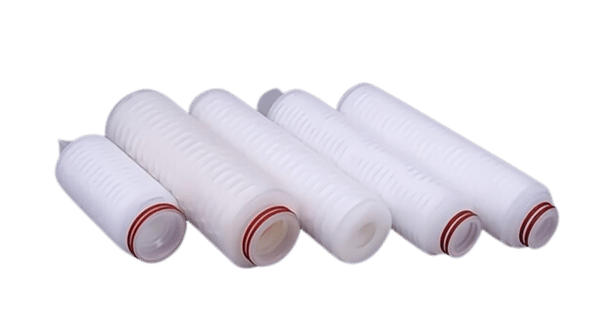
7. Applications in Microelectronics and Semiconductor Manufacturing
7.1 Importance of Filtration in Electronics Manufacturing
In the microelectronics and semiconductor industries, even microscopic contaminants can cause defects in wafers, circuits, or display components. As a result, ultrapure process water (UPW) and chemicals must be filtered to extremely high standards.
Nylon pleated filter cartridges are often used in:
Photoresist filtration
Etching and cleaning solution purification
CMP (Chemical Mechanical Polishing) slurry filtration
Rinse water polishing
Final filtration of plating and coating baths
Because nylon membranes are hydrophilic, cleanable, and have low extractables, they minimize ionic and organic contamination, ensuring consistent product yield and device reliability.
7.2 Key Benefits for Electronics Applications
High particle retention efficiency (down to 0.1 µm).
Low ionic extractables, suitable for semiconductor-grade purity.
Excellent resistance to alcohols, ketones, and organic solvents.
Non-fiber releasing, protecting precision equipment and circuits.
Thermal and mechanical stability during high-temperature rinsing or solvent cleaning.
These qualities make nylon pleated filters essential for ensuring the ultraclean environments required in semiconductor, LED, LCD, and photovoltaic manufacturing.
8. Applications in Power and Energy Sector
8.1 Water and Fuel Purification
In the power generation industry, filtration plays a crucial role in ensuring the performance and longevity of turbines, boilers, and cooling systems. Nylon pleated filter cartridges are applied in:
Boiler feed water pre-filtration
Turbine lubrication and hydraulic oil filtration
Cooling tower make-up water filtration
RO and ion-exchange system protection
Fuel conditioning and clarification
These filters protect critical equipment from particulate contamination and corrosion.
8.2 Why Nylon Filters Are Effective in Power Plants
High dirt-holding capacity reduces maintenance frequency.
Broad chemical compatibility with treatment chemicals and oils.
Dimensional stability under pressure and temperature changes.
Long service life even under continuous high-flow operations.
Because nylon is both strong and hydrophilic, it performs well in both aqueous and non-aqueous environments, making it a cost-effective and reliable choice for industrial power systems.
9. Comparison with Other Filter Cartridge Materials
Each membrane material used in pleated cartridges has specific advantages. The table below compares nylon pleated filter cartridges with other popular options like PES, PVDF, PTFE, and PP.
| Filter Material | Hydrophilicity | Chemical Resistance | Temperature Resistance | Typical Applications |
|---|---|---|---|---|
| Nylon (6/66) | Hydrophilic | Excellent to solvents, alcohols, weak acids | Up to 95°C | Water, food, pharmaceuticals, chemicals |
| PES (Polyethersulfone) | Hydrophilic | Good with aqueous fluids | Up to 85°C | Biotech, beverages, microelectronics |
| PVDF | Hydrophobic/Hydrophilic | Excellent chemical resistance | Up to 120°C | Chemical, pharmaceutical |
| PTFE | Hydrophobic | Superior resistance to all chemicals | Up to 130°C | Solvents, gases, aggressive chemicals |
| PP (Polypropylene) | Hydrophobic | Good general resistance | Up to 80°C | Prefiltration, wastewater |
Why Choose Nylon:
Naturally hydrophilic — no pre-wetting needed.
Excellent for both aqueous and organic solvents.
High mechanical strength and dimensional stability.
Cost-effective compared to PTFE or PVDF membranes.
In short, nylon pleated filter cartridges strike a perfect balance between cost, performance, and versatility, making them one of the most practical options for general industrial use.
10. How to Select the Right Nylon Pleated Filter Cartridge
Selecting the most suitable nylon pleated filter requires understanding your process conditions, system design, and required purity level.
10.1 Step 1 – Identify Filtration Purpose
Pre-filtration: Choose 1–10 µm for removing coarse particles.
Clarification: Use 0.45–1.0 µm for improving fluid clarity.
Sterile or final filtration: Use 0.1–0.22 µm for removing bacteria and microorganisms.
10.2 Step 2 – Consider Process Conditions
| Parameter | Recommendation |
|---|---|
| Temperature | Up to 95°C (continuous) |
| Pressure | Max 4 bar at 25°C |
| pH Range | 3 – 10 (neutral to weak acid/base) |
| Cleaning | CIP and backwash compatible |
If you handle strong acids or oxidizers, alternative materials like PVDF or PTFE are preferable.
10.3 Step 3 – Select Dimensions and End Connections
Common configurations include:
5”, 10”, 20”, 30”, and 40” lengths
DOE (Double Open End)
222/226 O-ring with fin or flat end caps
EPDM, Viton, or silicone seals
Ensure compatibility with your housing to avoid bypass or leakage.
10.4 Step 4 – Regulatory Compliance
For food, pharmaceutical, or drinking water applications:
Verify FDA CFR Title 21 compliance.
Confirm USP Class VI and Bacterial Challenge Test results.
Ensure filters are manufactured under ISO 9001 or ISO 13485 standards.
By following these steps, users can ensure the optimal combination of filtration efficiency, durability, and cost performance.
11. Maintenance and Service Life Optimization
Proper maintenance ensures longer service life and consistent performance for nylon pleated filters.
Maintenance Tips:
Monitor differential pressure: Replace the cartridge when ΔP exceeds 2.5–3.0 bar.
Perform regular backflushing: Use filtered water or mild cleaning solutions.
Avoid exposure to strong acids or oxidants.
Sanitize using hot water (85°C) or steam sterilization (121°C for 30 min).
Document replacement intervals to maintain GMP or ISO audit trails.
A well-maintained nylon filter can last 3–5 times longer than a standard non-pleated filter, reducing operational costs.
12. Future Developments in Nylon Filtration Technology
The filtration industry is evolving rapidly toward higher purity, sustainability, and smart monitoring systems. Nylon filter cartridges are also benefiting from these innovations.
Emerging Trends:
Hybrid membrane layers: Combining nylon with PP or PES for multi-stage filtration.
Antimicrobial coatings: Prevent biofilm formation in water and food systems.
Nanofiber-enhanced nylon membranes: Improving flow rate and retention efficiency.
Recyclable materials and eco-friendly production processes.
IoT-enabled filtration monitoring: Real-time tracking of pressure and flow performance.
These advancements will make nylon pleated filters even more efficient, sustainable, and reliable in future industrial filtration systems.
13. Conclusion
Nylon pleated filter cartridges have proven to be an exceptionally versatile and reliable solution for diverse industries. From water treatment and food production to pharmaceuticals, chemicals, and electronics, their hydrophilic nature, mechanical robustness, and high dirt-holding capacity make them indispensable components of modern filtration systems.
Key Takeaways:
Ideal for aqueous and organic solutions due to natural hydrophilicity.
Offer high flow rates and long service life through pleated design.
Suitable for sterile, prefiltration, and polishing applications.
Fully compliant with FDA and GMP standards for sensitive industries.
A cost-effective and efficient filtration solution across multiple sectors.
As technology continues to advance, nylon pleated filter cartridges will remain a cornerstone of industrial purification systems, combining reliability, performance, and environmental sustainability.

